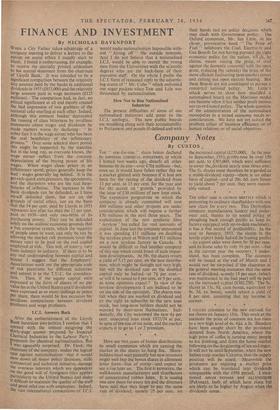By CUSTOS
rHE " one-for-one " share bcinus declared by IMPERIAL CHEMICAL INDUSTRIES, at which 1 hinted two weeks ago, dwarfs all other bonuses by its size—over £70i millionS--but, even so, it would have fallen rather flat on a market glutted with bonuses if it had not been for the raising of the dividend from 13 per cent. to 15 per cent. for the year and for the accent on growth ' provided by the issue of £30 millions of new loan stock. The expansion programme to which the company is already committed will cost £60 millions and other projects are under consideration which will require a further £70 millions in the next three years. The exploitation of the_ synthetic fibre
terylene ' has called for vast amounts of capital. In June last the company announced it was spending £11 millions on doubling the terylene plant at Wilton and $11 millions on a new terylene factory in Canada. It would be difficult to find another company of this size which could boast of such impor- tant developments. At 58s. the shares return a yield of 5.15 per cent. on the new distribu- tion, which might be thought not very lith, but will the dividend rate on the doubled capital only be halved—at 7i per cent.— or will it be raised to 8 per cent. or 9 per cent. as some optimists expect ? In view of the terylene developments 1 am inclined to be on the side of the optimists. The shares may fall when they are marked cx dividend and ex the right to subscribe to the new loan stock, but long-term holders should not be worried by short-term fluctuations. Inci- dentally, the City welcomed the new 41, per cent. unsecured loan stock 1972/74 at par, in spite of the size of the issue, and the market expects it to go to 1 or 2 premium.


































 Previous page
Previous page